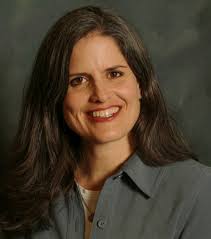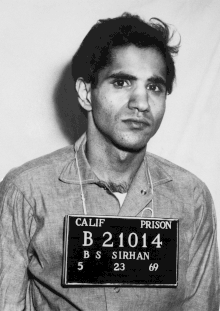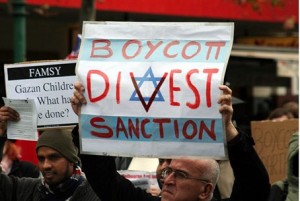|
President Donald Trump has twice tried to institute a travel ban on all refugees from six or seven Muslim-majority countries. During the presidential campaign, Trump called for a “total and complete shutdown of Muslims entering the United States,” slated to last “until our country’s representatives can figure out what is going on.” His Muslim ban has been struck down by two courts of appeals and may be headed to the Supreme Court.
With his mean-spirited bans, Trump aimed to capitalize on fear of Muslims fueled by the 9/11 terrorist attacks and exacerbated since by the U.S. government and the corporate media.
Long-standing prejudice against Arabs
This anti-Muslim sentiment is a continuation of long-standing prejudice against Arabs that reached its zenith during the last third of the 20th century. In her provocative book, “The Rise of the Arab American Left: Activists, Allies, and Their Fight Against Imperialism and Racism, 1960s-1980s,” Pamela Pennock traces the trajectory of Arab American leftist activism in the United States over a series of key decades.
Pennock writes about the enduring portrayal of “Arabs as variously exotic, erotic, savage, uncivilized, and incapable of autonomy.”
Indeed, media critic Jack Shaheen’s book and 2007 film, “Reel Bad Arabs: How Hollywood Vilifies a People,” document negative stereotypes of Arabs depicted in American movies.
“All aspects of our culture project the Arab as villain,” Shaheen says in the film.
He includes lyrics from the opening music of the Disney film “Aladdin”:
“Oh, I come from a land, from a faraway place, where the caravan camels grow, where they cut off your ear if they don’t like your face. It’s barbaric, but hey, it’s home.”
“Aladdin” has been seen by millions of children around the world.
Anti-Arab prejudice has also been fueled by Hollywood’s depictions of Arab women as
“highly sexualized belly dancer[s] … inspired by early images of the Orient as the place of exoticism, intrigue and passion,” Shaheen notes. More recently, however, “this image has dramatically changed: The Arab woman is now projected as a bomber, a terrorist.”
Events that politicized Arab Americans
These stereotypes are racist, sexist and patently false. Many Arabs came to the United States to study. Once here, they were moved to activism primarily by Israel’s treatment of the Palestinians.
 Author, Pamela Pennock (Source: mondoweiss.net) As Pennock observes, the single biggest factor that galvanized Arab Americans was the dispossession of Palestinian Arabs occasioned by the creation of the state of Israel and its occupation of Palestinian territories.
In order to establish Israel as a Jewish state in 1948, nearly 700,000 Palestinian Arabs were expelled from their homes and their land. They call it the Nakba, which means “catastrophe” in Arabic.
A second catalyzing event occurred in June 1967, 50 years ago this month. Israel, with help from the United States, invaded Egypt, Jordan and Syria and seized the Palestinian territories in the West Bank, Jerusalem, the Golan Heights and the Sinai Peninsula.
Later that year, the United Nations Security Council passed Resolution 242, which refers to
“the inadmissibility of the acquisition of territory by war” and calls for “withdrawal of Israel armed forces from territories occupied in the recent conflict.”
Nevertheless, Israel continues to occupy Palestinian territories it acquired in 1967.
In addition, the 1967 war stoked anti-Arab sentiment in the United States.
“While anti-Arab prejudice became especially pervasive and damaging after September 11, 2001, the stigmatization heightened in the aftermath of the 1967 war when many Americans increasingly grouped people of Arab heritage together, regardless of their citizenship or whether they resided in Arab nations or in the United States, and viewed them as threatening and suspicious,” Pennock writes.
The assassination of Robert F. Kennedy
 Sirhan Sirhan (Source: Wikipedia) One event intensified anti-Arab prejudice in the United States and made it difficult for Arab Americans to “dissociate from stereotypes of terrorists,” according to Pennock: the 1968 assassination of Robert F. Kennedy by Palestinian American Sirhan Sirhan.
Sirhan was 4 years old when he and his family were forced by the Israeli military to flee their home in Jerusalem. That trauma informed his perception of Israel. Sirhan was disturbed by U.S. support for Israeli policies. During the presidential campaign, Kennedy vociferously backed Israel. For the 24-year-old Sirhan, who suffered from mental illness, Kennedy’s words intensified his pain.
Attorney Abdeen Jabara, a member of Sirhan’s defense team, told Pennock that this confluence of events supported a diminished-capacity defense to the murder charge. Sirhan ultimately was convicted of murdering Kennedy and condemned to death. His sentence was later converted to life without possibility of parole when the law changed in California.
The Munich Olympics murders
Four years later, in an attempt to free Palestinian prisoners from Israeli jails, the Black September faction of the Palestine Liberation Organization murdered Israeli athletes at the Munich Olympics.
As a result of the 1972 massacre, the Nixon administration increased surveillance and investigation of Arab Americans, in a program called “Operation Boulder.”
Operation Boulder
“[B]ecause the Arab visa checks and investigations of Arab Americans were publicized in the American media as constituting the U.S. government’s reaction to the Munich massacre,” Pennock observes, “the government had in effect stigmatized all Arabs as suspect in the public’s mind.”
But the investigations
“never detected a single case of terrorist or espionage activity among Arabs living in the United States,” she reports.
Operation Boulder, which officially ended in 1975, lasted only two years. But the U.S. government continued to monitor Arab Americans for many years thereafter.
Many leaders in the Arab American community thought the real aim of Operation Boulder was
“to suppress Arab Americans’ legal political expression, particularly their pro-Palestinian activism … it was a program of political intimidation” that “also sought to ‘divide and conquer’ Arab American communities by making them suspicious of one another,” Pennock writes.
Jabara, one of those investigated during Operation Boulder, later wrote that the program could
“only be understood against the background of the definite pressure that [has] been brought to bear by Israel and its supporters in the U.S.”
Jabara told Truthdig,
“The matrix of the prejudice was part and parcel of the ‘unswerving commitment’ by the U.S. and its allies to Israel despite its gross violation of Palestinian rights. In short, there was an organic connection between the prejudice that was promoted in American popular culture as a support mechanism to a foreign policy that enabled Israeli aggression and colonization. Both the Americans and Israelis wanted to crush any resistance, regardless of what forms it took.”
In the wake of 9/11, in another racist operation, the Bush administration rounded up and incarcerated hundreds of Arab Americans who had committed no crime. Bush also instituted his Terrorist Surveillance Program to spy on people without judicial review. That program was codified by Congress and continued during the Obama administration.
In 2011, Wired uncovered FBI training materials that described how agents were taught to consider “mainstream” Muslims as supporters of terrorism.
The Intercept reported in 2014 that documents leaked by whistleblower Edward Snowden revealed that the FBI and the National Security Agency covertly read emails of prominent Muslim Americans, including lawyers, academics, civil rights activists and a political candidate.
Arab American activism
Jabara was a founder and past president of the Association of Arab American University Graduates (AAUG), the first national organization of Arab American peace and civil rights activists. Founded in 1967, AAUG was the most visible and active Arab American organization in the late 1960s and early 1970s. It had chapters in most U.S. cities and universities.
AAUG was
“a select group of Arab Americans [college graduates] who formulated a sense of ethnic identity, fostered community solidarity, and practiced progressive and transnational politics,” Pennock writes.
This group was committed “to an anti-racist, anti-imperialist analysis of Arab world problems” and was ideologically aligned with the global left. It aimed to demonstrate to Americans that “Zionism was a form of colonialism rather than a legitimate expression of Jewish nationalism.”
Significantly, AAUG “helped elevate the Palestinian struggle to the status of a premier universal human rights issue,” AAUG member Ghada Hasem Talhami later observed.
AAUG’s scholarly analysis, published in the Arab Studies Quarterly and other papers and monographs,
“was usually critical not only of Israel and U.S. policy in the Middle East but also of conservative Arab states,” Pennock notes. Following the 1967 war, Egypt and Syria had “demonstrably retreated from their commitment to pan-Arabism and Palestinian independence,” she adds.
Thus, Jabara notes, AAUG provided a forum for Arab intellectuals, artists, activists and political figures who may not have had such opportunities to meet in their home countries.
Jabara saw a natural alliance between the issues facing Arab Americans and the struggles of “Black Americans, Chicanos, Oriental Americans, young people and civil libertarians,” all of whom were “excluded from any meaningful participation in the American decision process.”
Most in the African-American community had traditionally formed alliances with Jews. But by the 1980s, many became increasingly critical of Israel’s treatment of the Palestinians, which they equated with South African apartheid.
The most significant factor driving U.S. foreign policy, according to Jabara, was not the Zionist lobby, but rather “America’s definition and pursuit of its economic interests in the region.”
Arab students, many of them members of the Organization of Arab Students (OAS), likened the struggle of the Palestinians to the Vietnamese fight for self-determination.
By the 1980s, the Muslim Student Organization supplanted OAS as the leading organization of Arab American students, who were increasingly becoming Muslims.
In 1980, Jabara helped form the American-Arab Anti-Discrimination Committee (ADC) with former Sen. James Abourezk and Arab American Institute founder James Zogby. Jabara also served as president of ADC, which is still a significant organization.
Jabara told Truthdig that the 1973 oil embargo by the Organization of Arab Petroleum Exporting Countries led to an
“uptick” in prejudice against Arab Americans. “That led to the creation of the ADC in 1980,” he added.
The National Lawyers Guild (NLG), the nation’s oldest and largest progressive bar association, was the first in the United States to be racially integrated. From the late 1960s through the mid-1970s, Jabara played the central role in convincing NLG to take up the issue of Palestine and the rights of Palestinians to self-determination. No issue has ever been as divisive in NLG. Some Jewish members left the organization, but it continues to oppose the Israeli occupation.
In 1977, Jabara led the first NLG delegation to Israel, Palestine, Syria and Jordan, and contributed to the delegation’s groundbreaking 1977 report on conditions in the occupied territories. That report was widely circulated within the then-young human rights network and is largely credited with paving the way for other organizations to break with the pro-Israeli orthodoxy and issue their own reports critical of Israeli human rights abuses.
Jabara was also a key participant in the lawsuit filed by NLG and the Center for Constitutional Rights against the FBI and the Anti-Defamation League of the B’nai B’rith for spying on NLG and other Arab American and progressive groups.
Anti-Zionism vs. Anti-Semitism
In 1975, the U.N. General Assembly, by a 2-to-1 margin, passed a resolution equating Zionism with racism. It drew parallels between Israeli Zionism and apartheid South Africa. The United States voted against the resolution.
 A BDS protest (Source: WikiMedia Commons) Beginning in the mid-to-late 1960s, people critical of Israel’s policies were accused of anti-Semitism, a characterization that persists to this day. Indeed, those who support the Boycott, Divestment and Sanctions (BDS) movement are often labeled anti-Semitic.
Following in the tradition of the Arab American call for the United Auto Workers to divest its Israeli bonds in the early 1970s, the BDS movement was launched by representatives of Palestinian civil society in 2005. They appealed to “international civil society organizations and people of conscience all over the world to impose broad boycotts and implement divestment initiatives against Israel similar to those applied to South Africa in the apartheid era … [including] embargoes and sanctions against Israel.”
This call for BDS specified that “these nonviolent punitive measures” should last until Israel fully complies with international law by
1) ending its occupation and colonization of all Arab lands and dismantling the barrier wall;
2) recognizing the fundamental rights of the Arab Palestinian citizens of Israel to full equality; and
3) respecting, protecting and promoting the rights of Palestinian refugees to return to their land as stipulated in General Assembly Resolution 194.
Students for Justice in Palestine, which focuses predominantly on the BDS movement, has been tarred as anti-Semitic by Zionist groups on campuses throughout the country.
But Rafeef Ziadah, a spokesperson for the Palestinian Boycott, Divestment and Sanctions National Committee, says,
“The BDS movement is opposed, as a matter of principle, to all forms of discrimination, including anti-Semitism and Islamophobia.”
In 2014, Palestinian human rights activist Omar Barghouti wrote in The New York Times,
“Arguing that boycotting Israel is intrinsically anti-Semitic is not only false, but it also presumes that Israel and ‘the Jews’ are one and the same. This is as absurd and bigoted as claiming that a boycott of a self-defined Islamic state like Saudi Arabia, say, because of its horrific human rights record, would of necessity be Islamophobic.”
Any criticism of Israeli policy is labeled anti-Semitism, even though many Jews—including members of Jewish Voice for Peace, Jewish Center for Nonviolence and IfNotNow—oppose the occupation.
Israel has invaded Gaza three times in the last seven years, killing thousands of Palestinians, including large numbers of women and children. The Black Lives Matter movement sees similarities between the police killings of African-Americans in the U.S. and Israel’s oppression of Palestinians, particularly in Gaza.
As the struggle against the Israeli occupation continues, Pennock’s compelling book is a must-read for progressives and all interested in a comprehensive history of Arab American activism. The parallels it draws with current events will inform today’s activists in our struggles for freedom and equality.
Marjorie Cohn is professor emerita at Thomas Jefferson School of Law, former president of the National Lawyers Guild, and a member of Jewish Voice for Peace. Her most recent book is “Drones and Targeted Killing: Legal, Moral, and Geopolitical Issues.” Visit her website at http://marjoriecohn.com/ and follow her on Twitter: https://twitter.com/m arjoriecohn.
Featured image: amazon.com
|